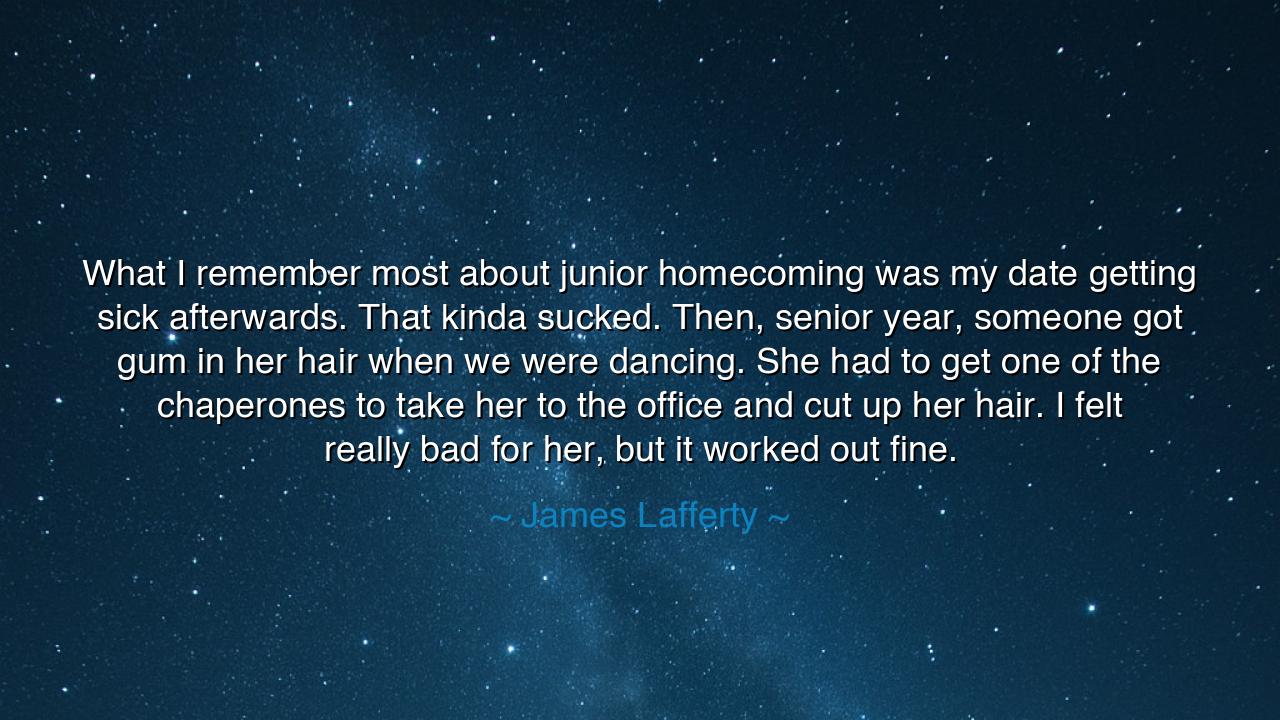
What I remember most about junior homecoming was my date getting
What I remember most about junior homecoming was my date getting sick afterwards. That kinda sucked. Then, senior year, someone got gum in her hair when we were dancing. She had to get one of the chaperones to take her to the office and cut up her hair. I felt really bad for her, but it worked out fine.






In the words of James Lafferty, we find a reflection that seems, at first glance, lighthearted and ordinary: “What I remember most about junior homecoming was my date getting sick afterwards. That kinda sucked. Then, senior year, someone got gum in her hair when we were dancing. She had to get one of the chaperones to take her to the office and cut up her hair. I felt really bad for her, but it worked out fine.” Yet within this simple recollection lies a quiet, enduring truth about the imperfection of life — the way even our most cherished moments are marked by flaws, by mishaps, and by the sweet, forgiving laughter that follows. Beneath the humor and memory is a lesson as old as humanity itself: that beauty is not found in perfection, but in how we respond to imperfection.
The homecoming dance, that symbol of youth, hope, and shining moments, becomes in his telling a stage not for glory, but for humanity. The faint awkwardness, the unexpected accident, the shared compassion — these are the true threads that weave memory into meaning. What we anticipate as flawless often unfolds with surprises, yet those surprises are what make the story worth remembering. His words, though casual, reveal a deeper wisdom: that the heart remembers not the perfection of an event, but the humanity within it.
The ancients, too, understood this paradox. In ancient Japan, artists developed the art of kintsugi — repairing broken pottery with gold, so that the cracks themselves became part of the beauty. What was once damaged became more precious for having been mended. In the same way, James Lafferty’s story reminds us that the small calamities of life — a partner’s illness, a ruined hairstyle, a spoiled evening — are not to be erased from memory, but embraced as the gold-filled cracks that make our lives uniquely our own. The laughter that follows sorrow, the forgiveness that follows frustration — these are the truest ornaments of the human heart.
The origin of his quote comes not from lofty philosophy, but from lived experience — from youth itself, that season of unguarded joy and unexpected lessons. The tone of his words reflects the easy humility of one who has learned that not everything must go as planned to have meaning. His remembrance of homecoming is not about triumph or romance, but about empathy — about feeling sorry for another, about letting time and kindness make things “work out fine.” In that simple phrase lies the quiet power of perspective: that what once felt unfortunate can later be seen with gratitude and even fondness.
There is something heroic, in its own gentle way, about learning to accept imperfection. The great philosopher Epictetus once said, “It is not what happens to you, but how you react to it that matters.” When James speaks of feeling bad for the girl whose hair had to be cut, yet seeing in the end that it “worked out fine,” he expresses the stoic grace of one who knows that misfortune, when met with compassion, loses its sting. The test of character lies not in how we avoid hardship, but in how we respond when it finds us.
In the ancient world, as in ours, the truly wise understood that life’s worth is measured not in unbroken happiness, but in the resilience of the heart. Even in moments of embarrassment, pain, or loss, the spirit learns endurance. The homecoming story may seem trivial, yet it mirrors the universal rhythm of life: we dance, we stumble, we rise, and we laugh again. What matters most is not the misstep, but the grace that follows it.
The lesson, therefore, is both simple and profound: Do not seek perfection — seek presence. In every flawed, awkward, or painful moment, there is something to cherish: a lesson, a bond, a memory that will shine more brightly over time. The practical action is this: when life disappoints, pause, breathe, and smile — for someday, what now seems unfortunate may become the story that warms your heart. Let gratitude transform every imperfection into art.
So, O listener, remember the wisdom hidden in the laughter of James Lafferty’s recollection: that the dance of life is not ruined by its stumbles, but defined by them. Every misstep, every imperfection, every act of kindness amid chaos is part of a greater music. The gold that fills the cracks of our days is compassion, and the beauty of our stories lies not in how flawless they are — but in how beautifully they endure.






AAdministratorAdministrator
Welcome, honored guests. Please leave a comment, we will respond soon